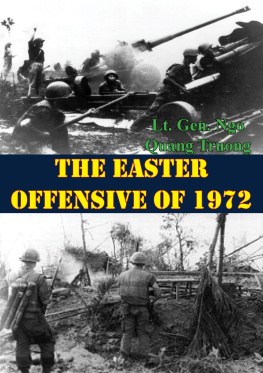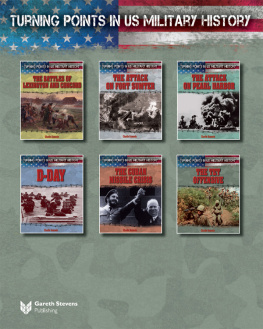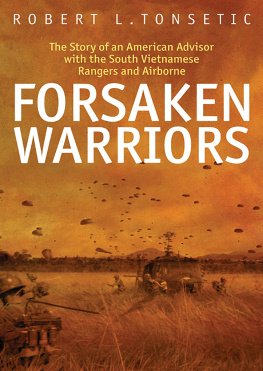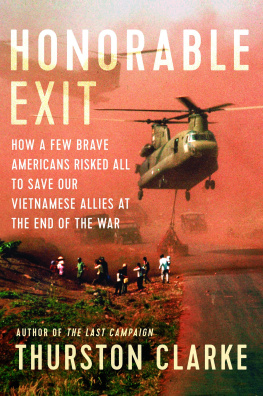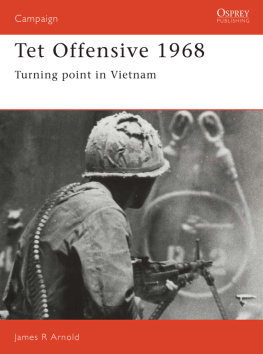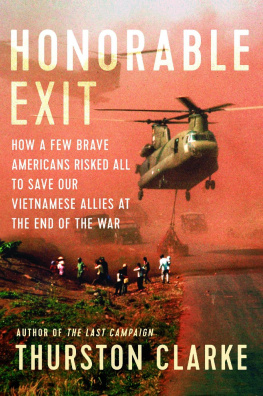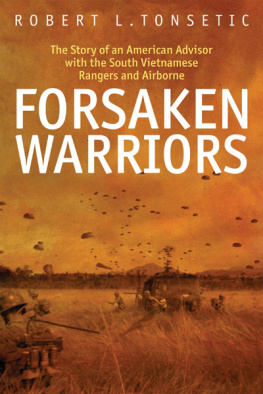Hell in An Loc
The 1972 Easter Invasion and the Battle that Saved South Viet Nam
Lam Quang Thi
University of North Texas Press
Denton, Texas
2009 Lam Quang Thi
Foreword by Andrew Wiest 2009 University of North Texas Press
All rights reserved.
Printed in the United States of America.
10 9 8 7 6 5 4 3 2 1
Permissions:
University of North Texas Press
1155 Union Circle #311336
Denton, TX 76203-5017
Library of Congress Cataloging-in-Publication Data
Lam, Quang Thi, 1932
Hell in An Loc : the 1972 Easter Invasion and the battle that saved South Viet Nam / Lam Quang Thi ; foreword by Andrew Wiest. -- 1st ed.
p. cm.
Includes bibliographical references and index.
ISBN 978-1-57441-276-5 (cloth : alk. paper)
ISBN 978-1-57441-359-5 (e-book)
1. Lam, Quang Thi, 1932-2. An Loc, Battle of, An Loc, Vietnam, 1972--Personal narratives, Vietnamese. 3. Easter Offensive, 1972--Personal narratives, Vietnamese. 4. Vietnam War, 1961-1975--Campaigns--Vietnam--An Loc--Personal narratives, Vietnamese. 5. Vietnam War, 1961-1975--Aerial operations, American--Personal narratives, Vietnamese. 6. Vietnam War, 1961-1975--Regimental histories--Vietnam (Republic). I. Title.
DS557.8.A5L36 2009
959.70434--dc22
2009020095
This electronic book made possible by the support of the Vick Family Foundation.
Contents
Illustrations
PHOTOS APPEARING
MAPS
Foreword
by Andrew Wiest
The American tragedy that was the Vietnam War is the subject of seemingly endless fascination in both U.S. academic and popular circles. Efforts to interpret the war range from big screen portrayals, including Tom Hanks in Forrest Gump and Mel Gibson in We Were Soldiers, to well-documented tomes on the military prosecution of the war, such as John Nagls Learning to Eat Soup with a Knife, that heavily influence present-day tactics in the ongoing Global War on Terror. Any attempts to explain this national fixation on or the ongoing influence of the Vietnam War leads back to the same uncomfortably dark riddle. How did the United States, historys greatest superpower and a nation that presumably stands for good, on one hand lose a war to a third-rate power like North Vietnam and on the other lose its soul amidst a cacophony of protests, war crimes trials, and assassinations?
The arbiters of Americas past, whether they be film directors, novelists, historians, or reporters, have provided a dizzying array of potential answers, some controversial and others taken as dogma, to explain American failure in the Vietnam War. President Lyndon Johnson was too distracted by his Great Society. The American media subverted the mission of the military. American society was too fractured, and the nations will was too weak. General William Westmoreland never understood the war that was his to command. The U.S. military relied on overly traditional tactics. The U.S. military did not rely enough on traditional tactics. The power of the U.S. Air Force was never truly unleashed. Airpower was used too indiscriminately. The ignominious roll call is, indeed, quite long, leaving no shortage of villainous characters contending for the leading part in the American morality play that is the history of the Vietnam War.
Much of the historical and cultural debate that swirls around the failure of the American war in Vietnam is complicated by the very fact that its participants all too often view the conflict simply as an American war. Arguably perpetuating the fatal flaw of the U.S. military effort in Vietnam, the American popular and historical consciousness regularly omits the Vietnamese from the story of their own war. What for Americans was but part of a much wider geopolitical chess match was for Vietnam a brutal civil war that fractured the nation along ethnic, social, religious, geographic, and economic fault lines the roots of which extended well beyond the transitory motivations and concerns of the Cold War. While popular portrayal concedes that the conflict in Vietnam can be dated back to 1945 and the re-imposition of French colonialism, actually the struggle can be seen as a part of a broader Vietnamese dynamic of south vs. north competition that extends back at least as far as the 1500s. Viewing such a complex conflict only from the perspective of its final foreign interloper is overly simplistic. A full understanding of the Vietnam War, and of Americas failed crusade, requires coming to terms with Vietnams Vietnam War.
The only Vietnamese who seem to register in the American public consciousness, and who receive coverage in most popular accounts of the war, are Americas enemiesVictor Charliethe cunning V.C., and the hard-bitten warriors of North Vietnam. Allowing time for and praise of enemy forces in Vietnam makes perfect historical sense, for facing such stalwart adversariesthe inheritors of a martial tradition that had bested everyone from the Mongols to the Chinesemakes Americas failure in its Vietnamese adventure somehow more palatable. By comparison, Americas allies, the South Vietnamese, receive little notice and have become very nearly historically invisible. When not totally ignored in western accounts of the conflict, the South Vietnamese usually receive only damning reference as a collection of cowards and incompetents who served a fatally flawed government that had little connection to Vietnams glorious past. In the popular historical mind, then, geopolitical fate forced the United States to back the wrong horse in the Vietnam War, setting the stage for all that followed in Americas great tragedy.
In recent years, though, western scholars have devoted an increased level of academic scrutiny to South Vietnam that has begun to reshape the history of the conflict. While the new history admits that South Vietnam and its military were flawed instruments, it maintains that the South had a deep connection to Vietnams past and was not simply predisposed to failure. Even the briefest of accounts of the South Vietnamese experience of war draw a picture that is uncomfortably at odds with the popular understanding of Americas war in South East Asia. As part of an imperfect alliance and in the service of a flawed state, the South Vietnamese fought for twenty-five years, at the cost of well over 200,000 military and at least 400,000 civilian dead. After the fall of Saigon, millions chose to flee to face an uncertain future abroad as refugees rather than to live under the rule of their brothers from the North. It seems, then, that many in South Vietnam fought long and hard for their own independence and were unwilling to accept defeat.
The emerging twin historical themes that the war in Vietnam was not simply an American war abroad and that South Vietnam was more than just a victim of history greatly complicate the standard intellectual framework that buttresses the American understanding of the conflict. A new generation of scholars, possessing proper language skills and lacking pre-conceived notions of those who lived through the troubled Vietnam era, must seek to unlock the history of Vietnam at wara history that includes both North and South and all of their institutional participants and contexts.
Historians who choose to work on Vietnam at war, though, face a great disadvantage. As a defeated nation, which the victorious North has labored diligently to expunge from history, the South left behind precious few documents or collective accounts of its war. As a result, the historical playing field is heavily weighted toward the North Vietnamese view of the conflict. There does exist, though, a thriving effort within the Vietnamese expatriate community in the United States (the South Vietnamese community) to chronicle its history and to laud its heroes. Written in Vietnamese and published without the national support that undergirds the efforts of their one-time foes, the South Vietnamese documentation of their perspective on the war has remained an underground effort that has gained little popular traction.
Next page

